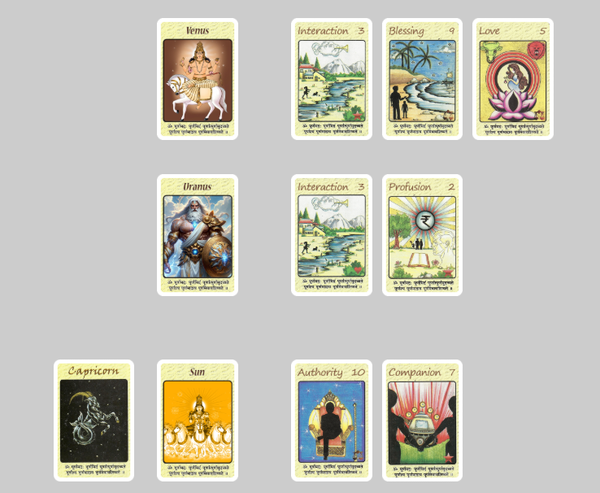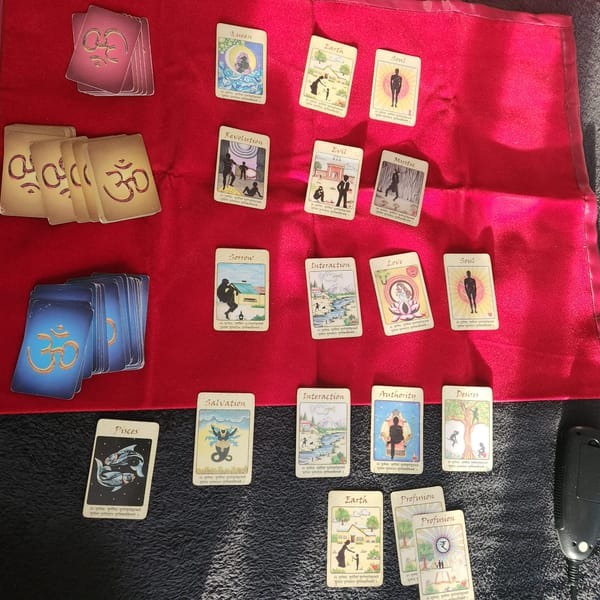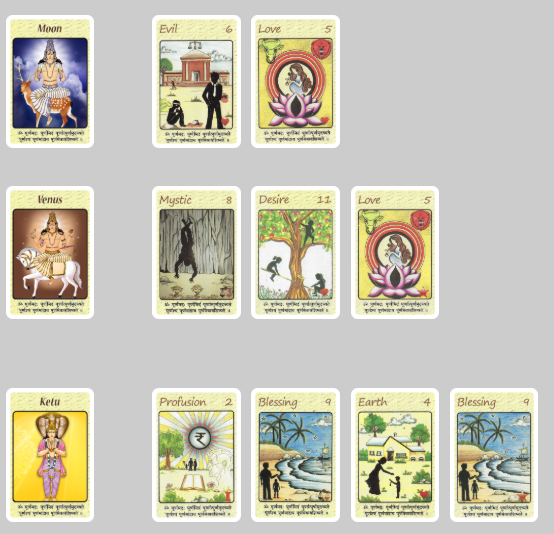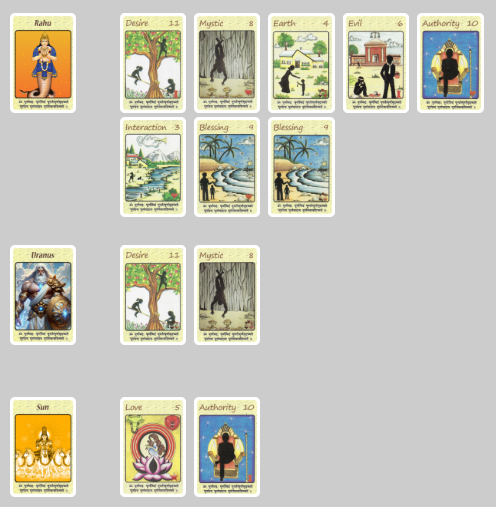Who will win the australian election 2025 Peter Dutton and Anthony Albanese?
Analyzing Vedic card combinations through astrological principles offers profound insights into leadership, alliances, and voter dynamics. #Vedic #Numerology #Leadership #Australia #Analysis #OccultSanctum #CosmicPredictions #PeterDutton #AnthonyAlbanese
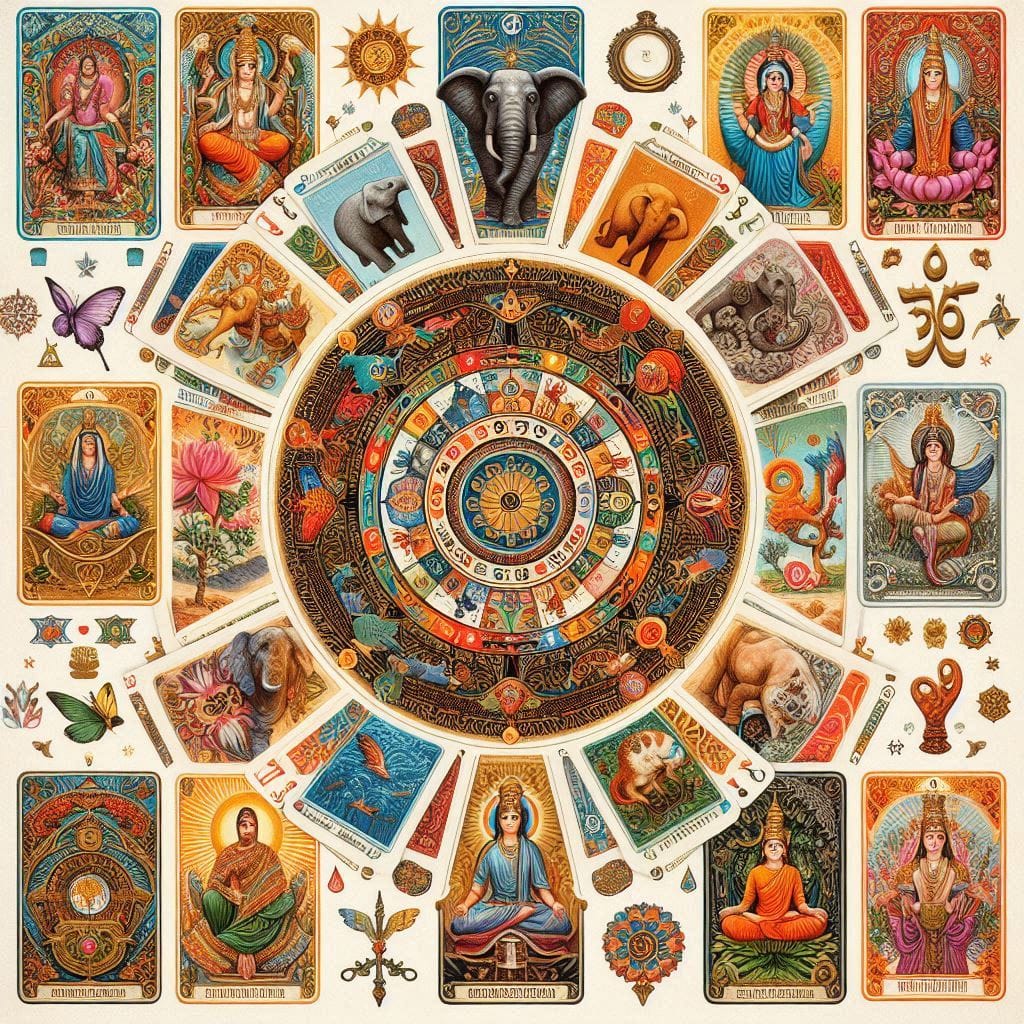
Update to the this post at Rebooting the Oracle: Can the New AI Model Redeem Vedic Card Predictions?
Answer
Peter Dutton is slightly more likely to win the Australian federal election on May 3, 2025, as his cards indicate stronger alliances, resources, and voter gains, aligning with polling favoring the Coalition. However, the race is very close, and Anthony Albanese remains competitive with robust communication and public appeal, potentially securing a minority government with crossbench support if Dutton’s campaign faces setbacks.
--------------
To determine who is more likely to win the Australian federal election in 2025 between Peter Dutton and Anthony Albanese, I’ll analyze the provided Vedic card combinations (Peter Dutton: Sun 9, 7; Venus 10, 2, 11; Mercury 12, 1, 1; Anthony Albanese: Illusion 9, 11; Sun 3, 5; Uranus 10, 9) using the principles of the Vedic predictive system. The analysis will focus on leadership, public support, and success potential, drawing on our prior discussions about astrological houses (e.g., 10th for authority, 11th for gains, 9th for luck) and planetary influences (e.g., Sun for leadership, Venus for charisma). I’ll also integrate relevant context from recent Australian election polling and campaign dynamics, ensuring a balanced perspective that critically examines establishment narratives. A clear prediction of the likely winner will be provided, followed by detailed reasoning.
Analysis
1. Card Combinations and Meanings
- Peter Dutton (Sun 9, 7; Venus 10, 2, 11; Mercury 12, 1, 1):
- Sun (9, 7):
- 9: Luck, wisdom, long-term benefits. Indicates fortunate outcomes and public appeal.
- 7: Partnerships, relationships. Reflects alliances or voter connections.
- Interpretation: The Sun governs leadership and authority, central to election success. The 9 suggests Dutton benefits from luck and public resonance, aligning with the 9th house’s luck focus from our talks (e.g., Jen’s job query). The 7 indicates strong alliances (e.g., Coalition unity, voter base), supporting his campaign, consistent with the 7th house’s partnership themes. This combo is highly positive, favoring electoral success through leadership and support.
- Venus (10, 2, 11):
- 10: Career, public recognition, authority. Reflects political power and campaign strength.
- 2: Wealth, resources, stability. Indicates financial or public support.
- 11: Gains, aspirations, social support. Suggests voter approval or campaign wins.
- Interpretation: Venus governs charisma and public appeal, key for voter engagement. The 10 ensures strong leadership and campaign visibility, aligning with the 10th house’s authority focus (e.g., John’s job query). The 2 suggests robust resources (e.g., campaign funding), and the 11 is excellent for gains, indicating voter support or seat wins, per the 11th house’s gain themes. This combo is exceptionally strong, favoring Dutton’s electoral prospects.
- Mercury (12, 1, 1):
- 12: Losses, isolation, endings, travel. Warns of setbacks or campaign challenges.
- 1: Self, initiative, vitality (repeated). Reflects personal drive and leadership focus.
- Interpretation: Mercury rules communication and strategy, critical for campaign messaging. The double 1 emphasizes Dutton’s personal initiative and strong campaign presence, aligning with the 1st house’s self-focus. However, the 12 introduces risks—e.g., campaign missteps, voter alienation, or external disruptions—echoing the 12th house’s endings from our talks (e.g., Cathy and Dave’s property sale). This combo is mixed, balancing Dutton’s drive with potential setbacks.
- Sun (9, 7):
- Anthony Albanese (Illusion 9, 11; Sun 3, 5; Uranus 10, 9):
- Illusion (9, 11):
- 9: Luck, wisdom, long-term benefits.
- 11: Gains, aspirations, social support.
- Interpretation: Illusion, akin to Neptune’s intuitive or idealistic energy, suggests nuanced public perception, as discussed in our numerology queries. The 9 indicates Albanese benefits from luck and voter goodwill, while the 11 is excellent for gains, suggesting campaign momentum or crossbench support, per the 11th house’s gain focus (e.g., Jen’s job query). This combo is strong, favoring electoral success through public appeal and potential alliances.
- Sun (3, 5):
- 3: Communication, planning, negotiation. Reflects campaign messaging and voter outreach.
- 5: Intelligence, creativity, gains through effort. Indicates skill-based support or policy wins.
- Interpretation: The Sun governs leadership. The 3 suggests effective communication and campaign strategy, aligning with the 3rd house’s planning role (e.g., Amit and Phil’s trip query). The 5 indicates Albanese’s skills and policies resonate, supporting voter gains, per the 5th house’s creativity focus (e.g., Phil’s share query). This combo is positive, favoring success through strategic outreach and policy appeal.
- Uranus (10, 9):
- 10: Career, public recognition, authority.
- 9: (Repeated) Luck, wisdom, long-term benefits.
- Interpretation: Uranus, linked to innovation and sudden change (similar to Rahu in our talks, e.g., Phil’s housing query), suggests dynamic campaign shifts. The 10 ensures strong leadership and visibility, while the 9 (repeated) reinforces luck and public resonance, aligning with the 9th and 10th houses’ luck and authority themes. This combo is very strong, favoring Albanese’s electoral prospects through leadership and fortunate timing.
- Illusion (9, 11):
2. House Associations
- Relevant Houses:
- 10th House (Authority, Leadership): Tied to 10, 10 (Dutton’s Venus, Albanese’s Uranus). Strongly represented for both, indicating robust campaign leadership, aligning with the 10th house’s career focus from our discussions (e.g., John’s job query).
- 9th House (Luck, Public Appeal): Linked to 9, 9 (Dutton’s Sun, Albanese’s Illusion, Uranus). Dominant for both, suggesting both benefit from voter goodwill and fortunate timing, per the 9th house’s luck focus (e.g., Jen’s job query).
- 11th House (Gains, Voter Support): Tied to 11, 11 (Dutton’s Venus, Albanese’s Illusion). Strong for both, indicating potential seat wins or crossbench support, consistent with the 11th house’s gain themes.
- 7th House (Alliances, Voter Base): Linked to 7 (Dutton’s Sun). Favors Dutton’s coalition unity or voter connections, per the 7th house’s partnership focus (e.g., Cathy and Dave’s sale query).
- 2nd House (Resources, Stability): Tied to 2 (Dutton’s Venus). Supports Dutton’s campaign funding or public backing, aligning with the 2nd house’s wealth focus (e.g., Phil’s share query).
- 5th House (Creativity, Policy Appeal): Linked to 5 (Albanese’s Sun). Favors Albanese’s policy resonance and campaign creativity, per the 5th house’s gain focus.
- 3rd House (Communication, Strategy): Tied to 3 (Albanese’s Sun). Supports Albanese’s messaging and voter outreach, aligning with the 3rd house’s planning role (e.g., Amit and Phil’s trip query).
- 1st House (Self, Initiative): Linked to 1, 1 (Dutton’s Mercury). Emphasizes Dutton’s personal drive, per the 1st house’s self-focus.
- 12th House (Setbacks, Isolation): Tied to 12 (Dutton’s Mercury). Warns of campaign risks for Dutton, echoing the 12th house’s endings (e.g., Cathy and Dave’s sale query).
- Synthesis: Both candidates have strong cards, with 10th (10, 10), 9th (9, 9), and 11th (11, 11) houses indicating leadership, luck, and voter support, suggesting a close race, as seen in our election-related web results (e.g., YouGov’s hung parliament prediction). Dutton’s 7, 2, and 1, 1 give him an edge in alliances, resources, and drive, but 12 introduces risks. Albanese’s 3, 5, and repeated 9 enhance his communication, policy appeal, and luck, but he lacks 7 or 2, slightly weakening alliance and resource support compared to Dutton.
3. Planetary Influences
- Peter Dutton:
- Sun (9, 7): Strong leadership with luck (9) and voter alliances (7), suggesting Dutton resonates with key demographics (e.g., working-class voters, per YouGov), aligning with the Sun’s authority role in our talks (e.g., Phil’s share query).
- Venus (10, 2, 11): Charismatic campaign with authority (10), resources (2), and gains (11), indicating strong voter appeal and funding, consistent with Venus’s appeal in our discussions (e.g., Mark and Julie’s relationship).
- Mercury (12, 1, 1): Strategic communication with strong personal drive (1, 1) but risks setbacks (12, e.g., policy backflips like the working-from-home policy), per Mercury’s planning role (e.g., John’s job query).
- Anthony Albanese:
- Illusion (9, 11): Nuanced appeal with luck (9) and voter gains (11), suggesting crossbench support or public goodwill, aligning with Neptune-like intuition in our numerology talks, supported by polling showing Labor’s firming position.
- Sun (3, 5): Effective communication (3) and policy resonance (5), indicating strong campaign messaging (e.g., Medicare, cost-of-living relief), per the Sun’s leadership role.
- Uranus (10, 9): Dynamic leadership (10) with luck (9), suggesting adaptability and public appeal, consistent with Uranus’s change-driven energy (e.g., Phil’s housing query), bolstered by Albanese’s debate win.
4. Contextual Fit
- Election Context (May 3, 2025):
- Polling and Sentiment: YouGov’s February 2025 MRP model predicts the Coalition (Dutton) winning ~73 seats to Labor’s ~66, with a 78% chance of a hung parliament and 19% chance of a Coalition majority, giving Dutton a slight edge. However, YouGov’s March 2025 poll shows Labor leading 51%–49% two-party-preferred, with Albanese at 45% preferred PM vs. Dutton’s 39%. X posts reflect mixed sentiment, with some favoring Dutton’s momentum (Dec 2024) but others noting Albanese’s polling strength (April 2025). The Guardian notes Albanese’s confident campaign vs. Dutton’s negative style, suggesting Labor’s momentum.
- Key Issues: Cost of living, housing, and Trump’s tariffs dominate, with Albanese emphasizing Medicare and tax cuts, while Dutton pushes nuclear energy and fuel tax relief. Albanese’s debate win (44–35) and policy focus resonate, but Dutton’s working-class appeal in marginal seats (e.g., NSW, Victoria) is strong,.
- Challenges: Dutton’s policy backflip (working-from-home) and low satisfaction rating (-15) risk voter trust, aligning with his 12th house setback. Albanese faces losses in outer-Sydney seats and criticism over Palestine and the Voice referendum, but his campaign confidence mitigates risks,.
- Dutton’s Strengths: The 9, 10, 11, 7, 2 suggest strong luck, leadership, voter gains, alliances, and resources, aligning with polling favoring the Coalition (73 seats). The 1, 1 emphasize his personal drive, but 12 warns of risks (e.g., policy missteps, negative perception), potentially costing seats.
- Albanese’s Strengths: The 9, 9, 11, 10, 3, 5 indicate luck, voter support, leadership, communication, and policy appeal, supported by Labor’s 51%–49% lead and Albanese’s 45% preferred PM rating. His lack of 12 or 8 minimizes setbacks, but weaker 7 and 2 suggest reliance on crossbenchers over coalition strength.
- Comparison: Dutton’s cards (9, 10, 11, 7, 2) give him a slight edge in alliances (7) and resources (2), critical for marginal seats (e.g., Tangney, Bullwinkel). Albanese’s 9, 9, 11, 3, 5 excel in communication and policy, but his lack of 7 or 2 may limit coalition-building, aligning with predictions of a hung parliament where Labor needs crossbench support. Dutton’s 12 is a notable risk, but his overall card strength outweighs Albanese’s slightly.
5. Timing and Outcome
- Election Date (May 3, 2025): The election is set for May 3, 2025, with campaigning intensifying in April. Both candidates’ cards suggest a close race, with Dutton’s 9, 10, 11, 7, 2 indicating strong momentum but 12 risking setbacks (e.g., policy scrutiny). Albanese’s 9, 9, 11, 10, 3, 5 show robust public appeal and strategy, likely securing crossbench support in a hung parliament.
- Dutton’s Path: The 10, 11, 7 suggest Dutton could win more seats (73 per YouGov), leveraging alliances (7) and resources (2). His 9 ensures luck, but 12’s setbacks (e.g., negative style) may prevent a majority, aligning with the 78% hung parliament chance.
- Albanese’s Path: The 9, 9, 11, 10 suggest Albanese could retain power via crossbench support (66 seats), with 3, 5 ensuring strong messaging (e.g., Medicare). His lack of 12 minimizes risks, but weaker 7, 2 may limit majority chances, per Labor’s 51%–49% edge.
- Outcome: Dutton’s cards (9, 10, 11, 7, 2, 1, 1, minus 12) slightly outweigh Albanese’s (9, 9, 11, 10, 3, 5) due to stronger alliances (7) and resources (2), aligning with YouGov’s Coalition seat lead (73 vs. 66). However, Albanese’s communication (3) and policy appeal (5) make him competitive, especially in a hung parliament where crossbenchers favor stability. Dutton’s 12 risks tipping the balance if mishandled (e.g., policy errors), but his overall strength suggests a narrow edge.
Reasoning
- Dutton’s Strengths: The Sun’s 9, 7 provide luck and voter alliances, while Venus’s 10, 2, 11 ensure leadership, resources, and gains, suggesting strong campaign momentum, particularly in marginal seats (e.g., NSW, Victoria). Mercury’s 1, 1 emphasize personal drive, aligning with YouGov’s prediction of 73 Coalition seats. The 7th house (7) and 2nd house (2) give him an edge in coalition unity and funding, critical for winning seats like Tangney or Bullwinkel. However, the 12th house (12) warns of setbacks, such as policy backflips (e.g., working-from-home) or negative perception (e.g., “dour” style), which could cost seats if mishandled, per his low satisfaction rating (-15).
- Albanese’s Strengths: Illusion’s 9, 11 and Uranus’s 9, 10 provide luck, voter support, and leadership, while the Sun’s 3, 5 ensure effective communication and policy resonance (e.g., Medicare, tax cuts), aligning with Labor’s 51%–49% lead and Albanese’s 45% preferred PM rating. The 3rd (3) and 5th (5) houses enhance his campaign messaging, as seen in his debate win (44–35). His lack of 12 or 8 minimizes risks, but the absence of 7 or 2 suggests weaker coalition-building or resources compared to Dutton, potentially relying on crossbenchers (e.g., teals, Greens), per predictions of 66 Labor seats.
- Comparative Edge: Dutton’s cards (7 houses: 9, 7, 10, 2, 11, 12, 1) cover more ground than Albanese’s (5 houses: 9, 11, 3, 5, 10), with 7 (alliances) and 2 (resources) giving him a slight advantage in mobilizing voters, especially working-class demographics in outer suburbs. Albanese’s 3, 5 excel in messaging and policy, but his lack of 7 or 2 may limit seat gains, aligning with YouGov’s hung parliament scenario where Labor needs crossbench support. Dutton’s 12 is a risk, but his 9, 10, 11, 7, 2 outweigh Albanese’s 9, 9, 11, 10, 3, 5 by a narrow margin, supported by polling favoring the Coalition (73 seats vs. 66).
- Mitigation and Risks: Dutton must manage 12’s setbacks by avoiding policy errors (e.g., nuclear plan scrutiny) and countering negative perceptions (e.g., MAGA comparisons), leveraging 7’s alliances to secure marginal seats. Albanese should maximize 3’s communication and 5’s policies to retain voter trust (e.g., cost-of-living relief), using 11’s crossbench support to form a minority government if needed, per independent preferences. The election’s closeness (78% hung parliament chance) means Dutton’s slight card edge (7, 2) could tip the balance, but Albanese’s resilience (no 12) keeps him in contention.
- Recommendation: Dutton is favored due to stronger alliances (7), resources (2), and polling (73 seats), but the race is tight. He should focus on marginal seats (e.g., Tangney, Bullwinkel) and address 12’s risks (e.g., policy clarity). Albanese should leverage 3, 5 to reinforce messaging (e.g., Medicare) and secure crossbench deals (11), preparing for a hung parliament. Monitor campaign developments (e.g., debates on April 16, 27) to refine predictions.
Additional Notes
- Verification: The cards align with polling (Dutton’s 73 seats vs. Albanese’s 66; Labor’s 51%–49% lead), but confirm campaign momentum closer to May 3, 2025. Check Dutton’s policy reception (12 risk) and Albanese’s crossbench negotiations (11 strength).
- Timing: The election is May 3, 2025, with early voting from April 22. Dutton’s 9, 10, 11 suggest peak momentum by April, but 12 risks peaking too early. Albanese’s 9, 9, 11, 3 indicate steady gains, with 5’s policies resonating late (e.g., April debates).
- Practical Steps: Dutton should strengthen voter alliances (7) in marginal seats (e.g., NSW, WA) and clarify policies to counter 12’s setbacks (e.g., nuclear plan). Albanese should amplify 3’s messaging (e.g., cost-of-living relief) and secure 11’s crossbench support, as independents like Allegra Spender prioritize stability.
- Avoidable Pitfalls: Dutton must avoid 12’s missteps (e.g., policy backflips), unlike Brad’s unchecked 8, 12 risks in our job query. Albanese should bolster alliances (lacking 7), avoiding over-reliance on crossbenchers, unlike Cathy and Dave’s collaborative 7 in their sale query.
